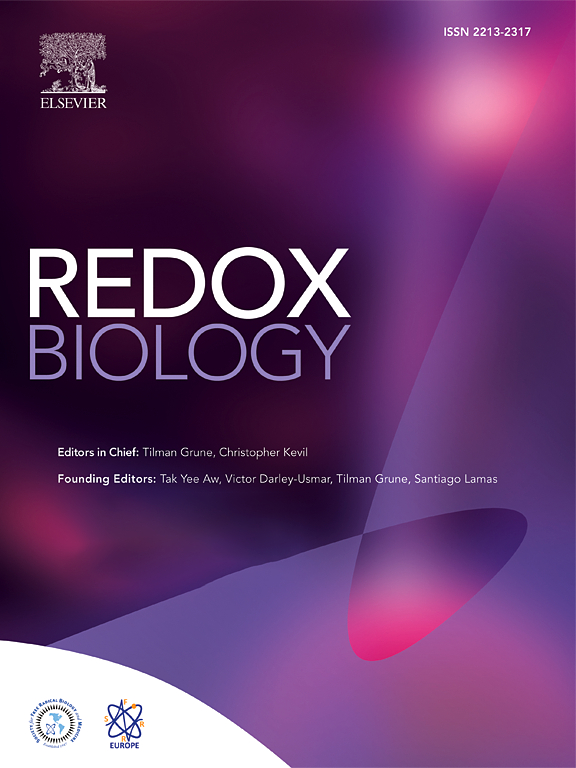内源性代谢物n -氯牛磺酸通过促进IRF3氧化而减弱抗病毒反应
IF 10.7
1区 生物学
Q1 BIOCHEMISTRY & MOLECULAR BIOLOGY
引用次数: 0
摘要
细胞微环境关键控制先天免疫反应的激活。n -氯牛磺酸(Tau-Cl)是一种内源性代谢物,在病原体侵袭过程中显著产生和分泌。然而,其对抗病毒先天免疫反应的影响尚不清楚。在这里,我们证明病毒感染上调细胞Tau-Cl水平。Tau-Cl减弱病毒感染诱导的I型ifn的表达,并促进病毒在体外和体内的复制。在机制上,Tau-Cl促进了IRF3在Cys222和Cys371位点的氧化,Cys222和Cys371是控制I型ifn转录的关键转录因子。Tau-Cl抑制IRF3的磷酸化和核易位,阻断IRF3与IFN-β启动子区域的结合。因此,我们确定了Tau-Cl是irf3驱动的抗病毒先天反应的内源性抑制因子,并通过影响宿主微环境揭示了病毒的免疫逃逸机制。本文章由计算机程序翻译,如有差异,请以英文原文为准。
Endogenous metabolite N-chlorotaurine attenuates antiviral responses by facilitating IRF3 oxidation
Cellular microenvironments critically control the activation of innate immune responses. N-chlorotaurine (Tau-Cl) is an endogenous metabolite that is markedly produced and secreted during pathogenic invasion. However, its effect on the antiviral innate immune responses remains unclear. Here, we demonstrate that viral infection upregulates cellular Tau-Cl level. Tau-Cl attenuates viral infection-induced expression of type I IFNs and facilitates viral replication both in vitro and in vivo. Mechanistically, Tau-Cl facilitates the oxidation of IRF3 at Cys222 and Cys371, a key transcription factor that governs the transcription of type I IFNs. Tau-Cl inhibits phosphorylation and nuclear translocation of IRF3, and blocks IRF3 binding to the IFN-β promoter region. Therefore, we identify Tau-Cl as an endogenous suppressor of IRF3-driven antiviral innate responses and uncover an immune escape mechanism of viruses by affecting host microenvironments.
求助全文
通过发布文献求助,成功后即可免费获取论文全文。
去求助
来源期刊

Redox Biology
BIOCHEMISTRY & MOLECULAR BIOLOGY-
CiteScore
19.90
自引率
3.50%
发文量
318
审稿时长
25 days
期刊介绍:
Redox Biology is the official journal of the Society for Redox Biology and Medicine and the Society for Free Radical Research-Europe. It is also affiliated with the International Society for Free Radical Research (SFRRI). This journal serves as a platform for publishing pioneering research, innovative methods, and comprehensive review articles in the field of redox biology, encompassing both health and disease.
Redox Biology welcomes various forms of contributions, including research articles (short or full communications), methods, mini-reviews, and commentaries. Through its diverse range of published content, Redox Biology aims to foster advancements and insights in the understanding of redox biology and its implications.
 求助内容:
求助内容: 应助结果提醒方式:
应助结果提醒方式:


